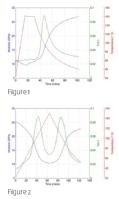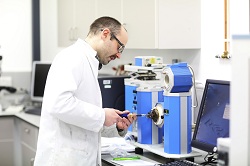Optimised Adhesives for Automotive Applications
The Triton Dynamic Mechanical Thermal Analyser is able to investigate mechanical properties of materials under a variety of temperature conditions. The analyser is able to study polymers, composites and adhesives.
Research Challenge
Future automotive body-in-white (BIW) solutions will involve multiple materials including metallic, polymeric and composite. It is likely that BIW assembly will include not only single material joints but also hybrid (dissimilar) joints. Current joining technology draws strongly on resistance welding and self-pier rivet methods, whereas joining diverse materials such as composites may need an emphasis on adhesives, novel fusion processes and mechanical fixing methods.
WMG, together with Alpha Adhesives, has investigated candidate adhesives for the joining of thermoplastic composites for BIW applications. Of these, a one part (1k) epoxy was considered to be a likely candidate.
In order to help evaluate the applicability of the proposed epoxy, a series of tests were performed using the Dynamic Mechanical Thermal Analyser (DMTA) at WMG. The DMTA is particularly useful for investigating the curing kinetics of adhesives and their post-cure heat performance. The Triton DMTA at WMG is able to investigate not only solid phase samples but also powders and viscous adhesives via the use of small steel test pockets.
Outcomes
 The adhesive was tested using a thermal profile to simulate an automotive paint-line process. Figure 1 shows the evolution of stiffness (pocket + advhesive), Tan δ, and temperature with time. During the initial heating phase, the stiffness of the sample is seen to decrease until, at around 18 minutes, there is an increase, indicating that chemical cross-linking has occurred. On cooling, full hardening is seen in both the modulus and Tan δ signals.
The adhesive was tested using a thermal profile to simulate an automotive paint-line process. Figure 1 shows the evolution of stiffness (pocket + advhesive), Tan δ, and temperature with time. During the initial heating phase, the stiffness of the sample is seen to decrease until, at around 18 minutes, there is an increase, indicating that chemical cross-linking has occurred. On cooling, full hardening is seen in both the modulus and Tan δ signals.
Once fabricated, it is important to understand the thermal performance of the joint and, here, DMTA can also be employed. Figure 2 shows the performance of a fully cured adhesive-filled pocket with varying temperature. The adhesive performs well up to around 100oc, above which modulus falls below 50% of its initial value. The DTMA allows in-depth investigation of both cure and post-cure behaviour and enables adhesives to be tailored for the required application.


